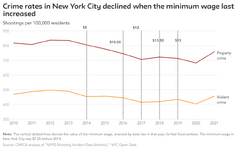bilby
Fair dinkum thinkum
- Joined
- Mar 6, 2007
- Messages
- 40,718
- Gender
- He/Him
- Basic Beliefs
- Strong Atheist
And the more machines are used, the more apparent it becomes that the humans were doing stuff in addition to the obvious, and that that stuff was massively undervalued by the bosses (and likely by the workers themselves), hence the ongoing problem of the workers being underpaid.It's a balance between the cost of the humans and the cost of the machines. The more humans cost the more it favors machines.I wonder why supermarkets are installing more self check outs and fast food places have those tablets to take your order. The ramifications for the increase in minimum wage for fast food workers will become apparent pretty soon.
It probably wouldn't matter how little the employees are paid, if mechanization lowers cost, wouldn't management see that as the path forward?
A machine to check out groceries is cheaper than a human clerk; But it's not cheaper to have the machine plus a human security guard, plus a human customer enquiry answerer, plus a store psychologist to listen sympathetically to the customer's woes...
The stuff a clerk does is not necessarily only the stuff in their job description, and they're adding a lot of value beyond the mere scanning of goods and collecting of payments.


